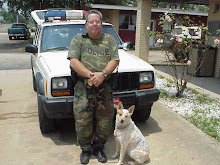Sunday, August 16, 2015
BOONDOCKING PART SIX
OF A SIX PART SERIES
By Larry Harmon
fresh water / black water handling techniques
Use of gravity to transfer fluids under boondocking conditions is not practical in many campsites. A couple of transfer pumps can make moving fresh water and black water simple. However those pumps need power and we solve that issue by using a battery jump start power pack on our twelve volt pumps. We clip the color coded power cables to the pump’s negative and positive wires and turn the pump on and off with the power pack’s front panel switch.
Our FRESH WATER PUMP is a salvaged pump that had started leaking in the pressure cut off switch’s diaphragm. Instead of throwing it away we converted it into our transfer pump using twelve dollars of hardware store brass fittings, a bit of Teflon tape and our fresh water pump is ready for action. Using water hose fittings we connect our transfer pump and white hose to our trailer mounted tank to put water into our camping trailer. Our transport barrel, complete with brass hose bib to hook up to, cost $40, At a local farm and supply, making it the least expensive of the two pumps.
Our BLACK WATER pump is a MACERATOR that we bought new off of EbAY. It and a “roll up flat” 5/8” hose designated for black water only, cost in the neighborhood of $200. Using the macerator pump we can pump black water up hill for short distances. Once again using the power pack and it’s switch for a power source. We chose a macerator that came in a plastic hard case for weight and storage considerations and the reel up, lay flat hose for the same reasons.
Our BATTERY JUMPSTART PACK was purchased at a discount tool supply for about $60. We have hauled it many thousands of miles while constantly charging and discharging it under rigorous conditions. A quick word of advice about the power pack. It can have a small inverter and an air compressor built into it as well as a work/safety light and a 12 volt power outlet. This is a place where we felt it well advised to spend a little extra to get one with all of the features that we thought we might need.
We even use this battery pack to power up our twelve volt impact wrench that we use during a flat tire change.
Monday, August 3, 2015
BOONDOCKING PART FIVE of a six part series by Larry Harmon
BOONDOCKING PART FIVE
Of a six part series by Larry Harmon
Extended stays and support methods
When you are in your favorite primitive campsite and the ranger comes around to say that your twenty eight day stay will be up tomorrow, and you immediately think, “so soon ?”, you likely have a good system of extended support figured out.
In addition to our camping trailer we pull a boat and a small support trailer to our favorite primitive campsites. That trailer has a black water tank and a fresh water tank on it and we will make a short trip to the nearest dump and fresh water fill station every couple of weeks.
For many this just isn’t practical and they carry water in a roof top fresh water bladder or jugs, then tow the trailer to dump black water as needed.
If your camper is a larger one that it isn’t practical to pull out to a dump station, black water tanks come in various sizes and brand names such as “sani tote” and weight can be an issue for transporting them, for example, at roughly eight pounds per gallon, a thirty five gallon “blue boy” might be more than one would want to handle.
Putting the portable black water tank on a receiver hitch cargo carrier works well for dumping, but, may be too high to gravity fill directly.
Macerator pumps can solve the problem of getting the black water from the camper to the portable tank and they may be powered from a Jump start battery pack or a trailer plug. We prefer the jumper pack for power because we use it to power up other things around the campground.
Generator size can relate directly to your camping style and I tend to look at it this way. Need a microwave, air conditioning or maybe a hair dryer ? Then you need to bring a big generator and a big gas can for it.
Most folks can quite readily camp for extended stays with a small quiet and fuel efficient one thousand watt generator that they run sparingly in the morning and maybe in the evening. Ours uses about half a gallon of gasoline in eight hours or roughly four days.
Betty and I just completed an extended stay at a lake and it was ever so fine sleeping with the windows open listening to the loons calling across the lake was so wonderful !
Subscribe to:
Comments (Atom)

